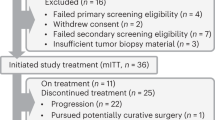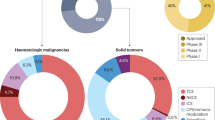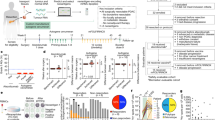Abstract
Objective
We explored the association of prostate cryotherapy and immunomodulation with granulocyte-macrophage colony-stimulating factor (GMCSF) in the generation of detectable tumor-specific T- and B-cell responses in men with prostate cancer.
Materials and methods
A randomized pilot study of patients assigned to either cryotherapy alone (Control group) or in combination with GMCSF (Treatment group). The impact of therapy on the development of T- and B-cell responses against tumor-related antigens was studied using enzyme-linked immune absorbent spot (ELISpot) and protein microarray panels (Sematrix) assays, respectively. Fold changes in response to treatment were calculated by normalization of post-treatment ELISpot values against the mean pre-cryoablation response. Student t tests between treatment and control groups at 4 weeks and 12 weeks across all the antigens were performed.
Results
A total of 20 patients were randomized to either control or treatment arm. At 4 weeks after cryotherapy, the treatment group demonstrated an average fold change in cancer antigen-related antibodies of 2.8% above their mean baseline values, whereas controls averaged an 18% change below mean baseline (p < 0.05). At 12 weeks, antibody response in treatment group increased to 25% above baseline, while the average of control group patients remained 9% below baseline (p < 0.05). Patients in treatment group displayed, on average, higher ELISPOT readings for the 4- and 12-week times points (527 vs 481 for PSA and 748 vs 562 for PAP).
Conclusions
GMCSF appeared to broadly elevate antibodies against prostate-specific and nonspecific antigens. Prostate antigen-specific T-cell responses were more enhanced over non-prostate-specific responses, preferentially in the treatment group. Our findings suggest a possible therapeutic effect of adjuvant immunotherapy in association with cryotherapy for the treatment of prostate cancer.
This is a preview of subscription content, access via your institution
Access options
Subscribe to this journal
Receive 4 print issues and online access
$259.00 per year
only $64.75 per issue
Buy this article
- Purchase on Springer Link
- Instant access to full article PDF
Prices may be subject to local taxes which are calculated during checkout





Similar content being viewed by others
References
Siegel RL, Miller KD, Jemal A. Cancer statistics, 2019. CA Cancer J Clin. 2019;69:7–34.
Schreiber RD, Old LJ, Smyth MJ. Cancer immunoediting: integrating immunity’s roles in cancer suppression and promotion. Science. 2011;331:1565–70.
Rekoske BT, McNeel DG. Immunotherapy for prostate cancer: false promises or true hope? Cancer. 2016;122:3598–607.
Rini BI, Fong L, Weinberg V, Kavanaugh B, Small EJ. Clinical and immunological characteristics of patients with serologic progression of prostate cancer achieving long-term disease control with granulocyte-macrophage colony-stimulating factor. J Urol. 2006;175:2087–91.
Amato RJ, Hernandez-McClain J, Henary H. Phase 2 study of granulocyte-macrophage colony-stimulating factor plus thalidomide in patients with hormone-naive adenocarcinoma of the prostate. Urol Oncol. 2009;27:8–13.
Song L, Zhou X, Li X. Phase II trial of granulocyte-macrophage colony-stimulating factor plus thalidomide in older patients with castration-resistant prostate cancer. Mol Clin Oncol. 2015;3:865–8.
Kantoff PW, Higano CS, Shore ND, Berger ER, Small EJ, Penson DF, et al. Sipuleucel-T immunotherapy for castration-resistant prostate cancer. N Engl J Med. 2010;363:411.
Levy MY, Sidana A, Chowdhury WH, Salomon SB, Drake CG, Rodriguez R, et al. Cyclophosphamide unmasks an antimetastatic effect of local tumor cryoablation. J Pharmacol Exp Ther. 2009;330:596–601.
Nesslinger NJ, Sahota RA, Stone B, Johnson K, Chima N, King C, et al. Standard treatments induce antigen-specific immune responses in prostate cancer. Clin Cancer Res. 2007;13:1493–502.
Dranoff G, Jaffee E, Lazenby A, Golumbek P, Levitsky H, Brose K, et al. Vaccination with irradiated tumor cells engineered to secrete murine granulocyte-macrophage colony-stimulating factor stimulates potent, specific, and long-lasting anti-tumor immunity. Proc Natl Acad Sci USA. 1993;90:3539–43.
Becker JT, Olson BM, Johnson LE, Davies JG, Dunphy EJ, McNell DG. DNA vaccine encoding prostatic acid phosphatase (PAP) elicits long-term T-cell responses in patients with recurrent prostate cancer. J Immunother. 2010;33:639–47.
Ramos-López P, Irizarry J, Pino I, Blackshaw S. Antibody specificity profiling using protein microarrays. Methods Mol Biol. 2018;1785:223–9.
Sanda MG, Cadeddu JA, Kirkby E, Chen RC, Crispino T, Fontanarosa J, et al. Clinically Localized prostate cancer: AUA/ASTRO/SUO guideline. Part II: recommended approaches and details of specific care options. J Urol. 2018;199:990–7.
Litwin MS, Tan H. The diagnosis and treatment of prostate cancer: a review. JAMA. 2017;317:2532–42.
Wilt TJ, Brawer MK, Jones KM, Barry MJ, Aronson WJ, Fox S, et al. Radical prostatectomy versus observation for localized prostate cancer. N Engl J Med. 2012;367:203–13.
Wilt TJ, Brawer MK, Jones KM, Andriole GL, Culkin D, Wheeler T, et al. Follow-up of prostatectomy versus observation for early prostate cancer. N Engl J Med. 2017;377:132–42.
Thomsen FB, Jakobsen H, Niels CL, Borre M, Jakobsen EB, Frey A, et al. Active surveillance for localized prostate cancer: nationwide observational study. J Urol. 2019;201:520–7.
Tan HJ, Marks LS, Hoyt MA, Kwan L, Filson CP, Macairan M, et al. The relationship between intolerance of uncertainty and anxiety in men on active surveillance for prostate cancer. J Urol. 2016;195:1724–30.
Latini DM, Hart SL, Knight SJ, Cowan JE, Ross PL, Duchane J, et al. The relationship between anxiety and time to treatment for patients with prostate cancer on surveillance. J Urol. 2007;178:826–32.
Valerio M, Cerantola Y, Eggener S, Lepor H, Polascik TJ, Villers A, et al. New and established technology in focal ablation of the prostate: a systematic review. Eur Urol. 2017;71:17–34.
Barqawi A, Pessoa RR, Al-Musawi M, MacDermott T, O’Donnell CI. The impact of performing a 3D mapping biopsy prior to primary cryotherapy for the treatment of prostate cancer. Urology. 2020;144:171–6.
Eggener SE, Scardino PT, Carroll PR, Zelefsky MJ, Sartor O, Hricak H, et al. Focal therapy for localized prostate cancer: a critical appraisal of rationale and modalities. J Urol. 2007;178:2260–7.
Ward JF, Pisters LL. Considerations for patient selection for focal therapy. Ther Adv Urol. 2013;5:330–7.
Nguyen MC, Tu GH, Koprivnikar KE, Gonzales-Edick M, Jooss KU, Harding TC. Antibody responses to galectin-8, TARP and TRAP1 in prostate cancer patients treated with a GMCSF-secreting cellular immunotherapy. Cancer Immunol Immunother. 2010;59:1313–23.
Beinart G, Rini BI, Weinberg V, Small EJ. Antigen-presenting cells 8015 (Provenge) in patients with androgen-dependent, biochemically relapsed prostate cancer. Clin Prostate Cancer. 2005;4:55–60.
Burch PA, Croghan GA, Gastineau DA, Jones LA, Kaur JS, Kylstra JW, et al. Immunotherapy (APC8015, Provenge) targeting prostatic acid phosphatase can induce durable remission of metastatic androgen-independent prostate cancer: a Phase 2 trial. Prostate. 2004;60:197–204.
Kantoff PW, Schuetz TJ, Blumenstein BA, GlodeML, Bilhartz DL, Wyand M, et al. Overall survival analysis of a phase II randomized controlled trial of a Poxviral-based PSA-targeted immunotherapy in metastatic castration-resistant prostate cancer. J Clin Oncol. 2010;28:1099–105.
Snapper CM, Moorman MA, Rosas FR, Kehry MR, Maliszenski CR, Mond JJ. IL-3 and granulocyte-macrophage colony-stimulating factor strongly induce Ig secretion by sort-purified murine B cell activated through the membrane Ig, but not the CD40, signaling pathway. J Immunol. 1995;154:5842–50.
Weber GF, Chousterman BG, Hilgendorf I, Robbins CS, Theurl I, Gerhardt LMS, et al. Pleural innate response activator B cells protect against pneumonia via a GMCSF-IgM axis. J Exp Med. 2014;211:1243–56.
Faries MB, Hsueh EC, Ye X, Hoban M, Morton DL. Effect of granulocyte/macrophage colony-stimulating factor on vaccination with an allogeneic whole-cell melanoma vaccine. Clin Cancer Res. 2009;15:7029–35.
Funding
Unrestricted research grant, “Endocare Inc”
Author information
Authors and Affiliations
Corresponding author
Ethics declarations
Conflict of interest
The authors declare that they have no conflict of interest.
Additional information
Publisher’s note Springer Nature remains neutral with regard to jurisdictional claims in published maps and institutional affiliations.
Supplementary information
Rights and permissions
About this article
Cite this article
Barqawi, A.B., Rodrigues Pessoa, R., Crawford, E.D. et al. Boosting immune response with GM-CSF optimizes primary cryotherapy outcomes in the treatment of prostate cancer: a prospective randomized clinical trial. Prostate Cancer Prostatic Dis 24, 750–757 (2021). https://doi.org/10.1038/s41391-021-00321-8
Received:
Revised:
Accepted:
Published:
Issue Date:
DOI: https://doi.org/10.1038/s41391-021-00321-8
This article is cited by
-
Advances in bio-immunotherapy for castration-resistant prostate cancer
Journal of Cancer Research and Clinical Oncology (2023)



